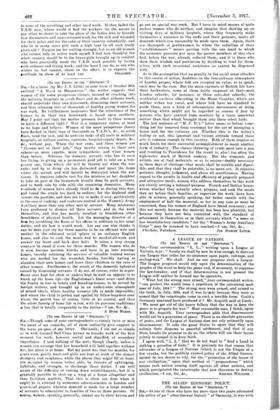A LEAGUE OF NATIONS.
CTo THE EDITOE or ens " Semearet."1 SIR,—Your correspondent "L. L.," writing upon a League of Nations, stays: " Surely we shall by now be wise enough to distrust any League that relies for its existence upon paper, red-tape, and sealing-wax." We shall. And no one proposes such a League. The League proposed would rely upon the determination of the peoples of the word to keep the peace and, if necessary, to suppress the law-breaker, and if that determination is not present the League will neither be formed nor be operative.
" What but the strong man armed," your correspondent writes, "can protect the world from a repetition of the calculated mad- ness of July, 1914?" The strong men were armed, and armed to the teeth, in July, 1914, and it was largely because they were so armed that the catastrophe came in such a terrible form. Could a Germany unarmed have produced it ? Mr. Asquith said at Leeds: " We must get rid of the hoary fallacy that the way to keep the peace ie to prepare for war." Most reasonable men, I think, agree with Mr. Asquith. Your correspondent adds that disarmament would not be a guarantee of peace. There is no absolute guarantee of peace, and the League of Nations does not rely primarily upon disarmament. It asks the great States to agree that they will submit their disputes to peaceful settlement, and that if any State breaks its promise to do so, the others will use their forces jointly to compel it to keep faith.
I agree with " L. L." that we do not want to " lend a hand in making a paradise of fools." It is precisely for that reason that advocates of a League of Nations (which is not the Utopia of a few cranks, but the publicly avowed policy of the Allied Govern- ments) do not desire to rely, for the " protection of the house of our civilization," upon that method of " preparedness " which means each nation arming itself against all other nations, and which precipitated the catastrophe that now threatens to destroy














































 Previous page
Previous page